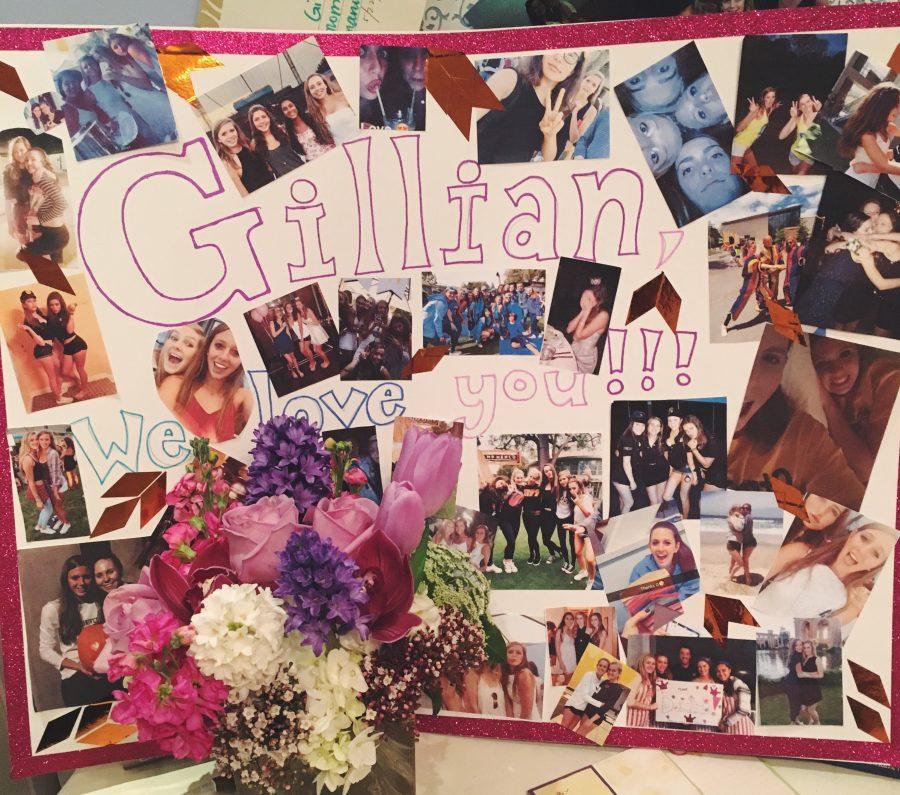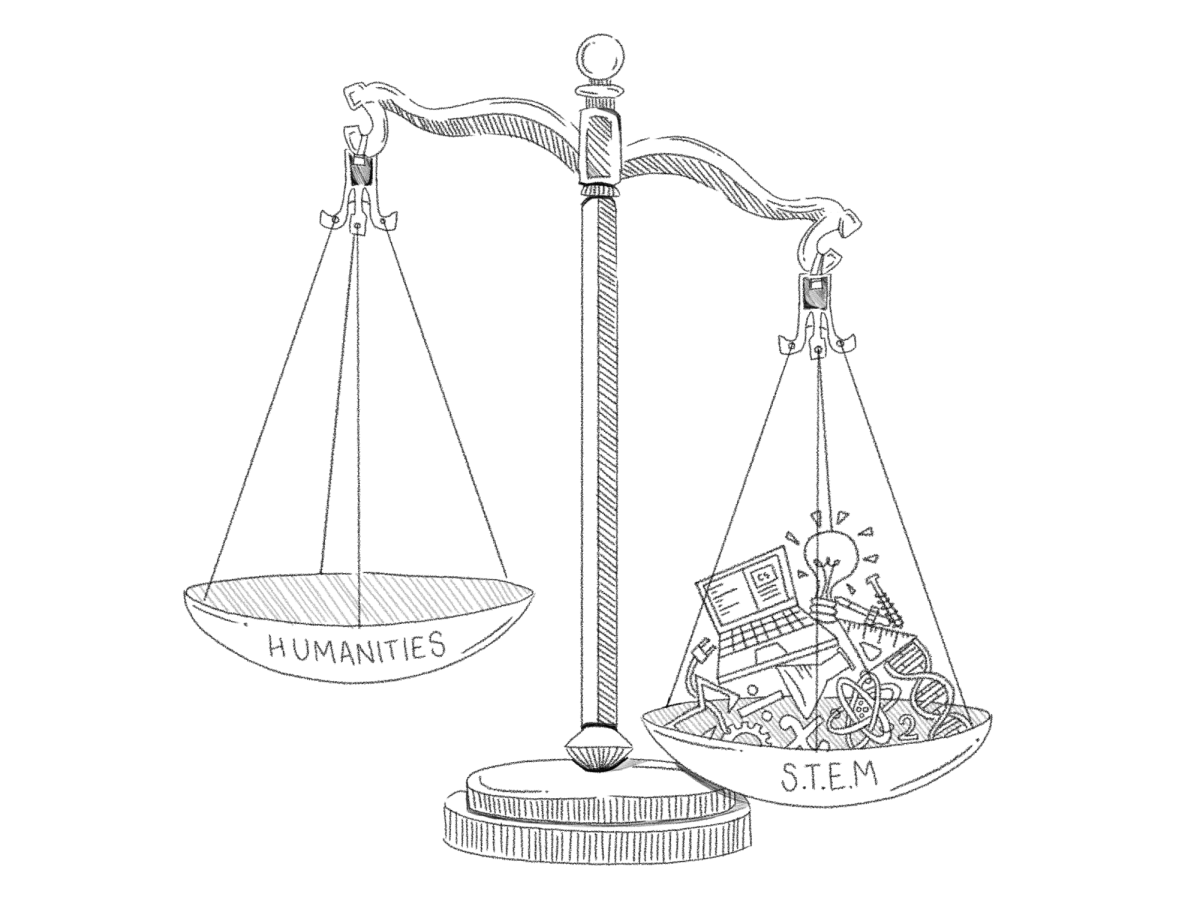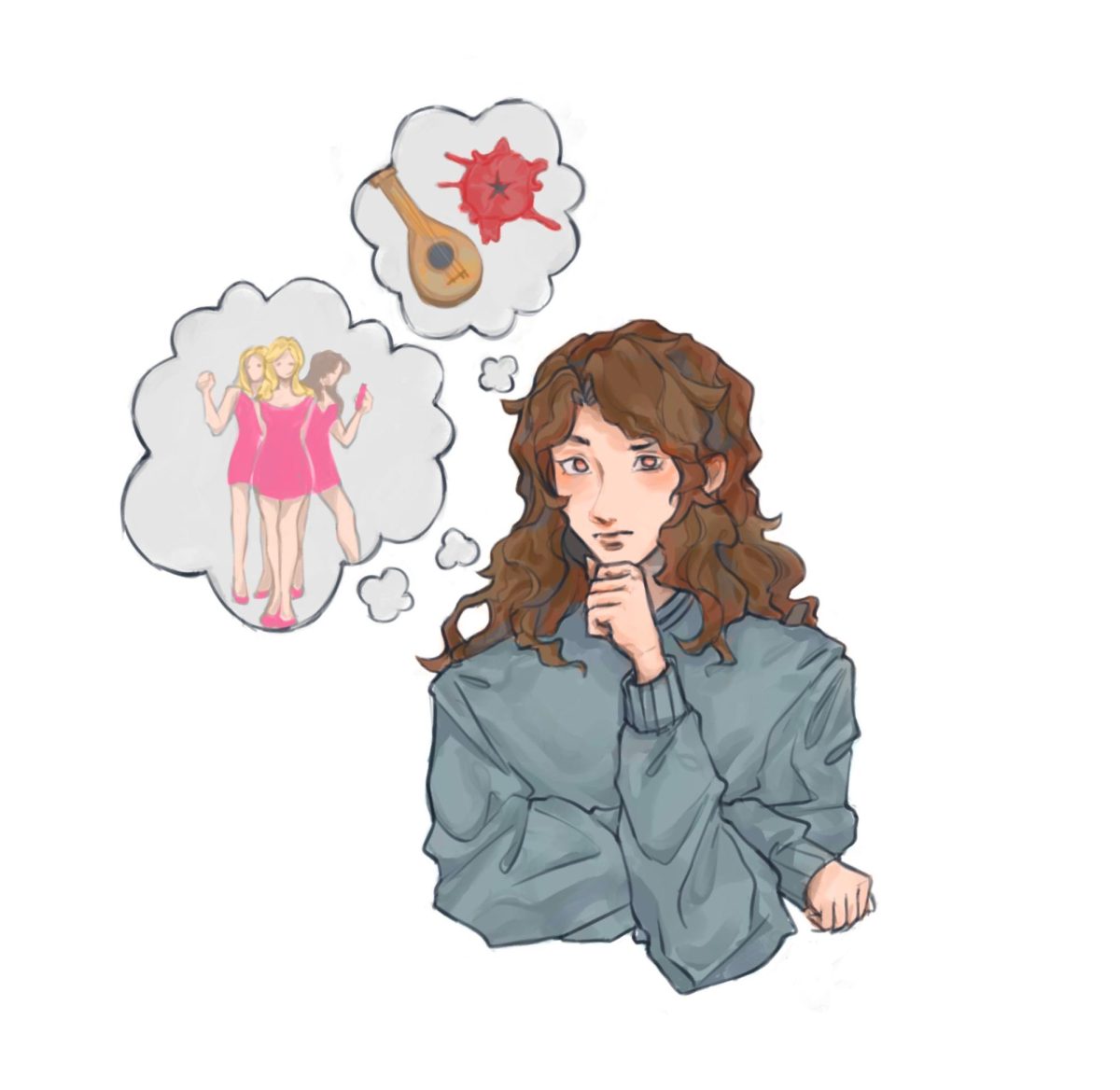Junior Gillian Bressie reflects on her recent hospitalization with hopes to spark further discussion. Staff photo by Gillian Bressie.
By Gillian Bressie
Author’s Note:
Throughout the weeks following my hospitalization, there have been a lot of rumors about what happened to me. My intention in writing this is to both dispel those rumors and to bring awareness to mental health issues by sharing my experience. Mental health is stigmatized, not just at Menlo but everywhere. I hope that by opening up about my struggle, I can empower others to get the help they may need. I also want to stress that I don’t claim to represent the experiences or opinions of everyone who has gone through this; this story is only reflective of my experience and feelings.
On Jan. 19 at around 9:30 p.m. I no longer wanted to live and had planned to kill myself. My parents noticed the gravity of the situation and did their best to calm me down. They later decided to take me to the emergency room. Once I was there, after waiting for a few hours, I was given a gown, all of my personal belongings were taken from me, and I was left in a mostly empty room for a few hours with only a bed and large glass windows. They took my blood, ran a few other tests and sent a nurse in to talk to me.
The first thing the nurse asked me was, “Why are you here?” As I thought about how to answer his question, a number of responses popped into my head.
1. I don’t really like myself.
2. My dad gave me no choice.
3. I’m overwhelmed by my life.
4. I want to die.
But finally, I determined that the most pertinent response was, “I tried to kill myself.” Even to this day it’s hard for me to say it without crying. One thing I learned in my time in the hospital is that those words don’t really get any easier to say the more you say them.
I finally arrived at the Adolescent Mental Health department of Mills Peninsula Hospital around 4:00 a.m. on Friday morning.
Those of you who know me well might know that I wear a gold necklace every day with my monogram on it. One of the first things they did when I stepped foot in the facility was take it from me because they didn’t trust me not to strangle myself with it. Another thing I learned in my time in the hospital is that programs like that are not intended to be therapeutic or healing; their only goal is to protect you from yourself.
They gave me two minutes to text everyone a number they could call to talk to me. In a rush, I wrote out, “I’m going to be in the hospital for a few days. I’m OK. Call me at this number,” and texted it to my closest friends. Realizing my message may incite more concern than relief, I added on, “Niko can explain,” as he was the only friend I had told about this. Unfortunately for him, he soon became the center of all knowledge about my situation.
I put my phone, necklace, and earrings in a bag and sent them off to a safe, not seeing them again until my release. At least they gave me back my own clothes.
I slept in a foreign place in a room full of foreign items, alone and unable to talk to anyone I knew who loved and cared about me.
When my head nurse woke me up around 8:00 a.m. the next morning, I already had phone calls from three of my friends wanting to talk to me and see if I was OK. I joined about 11 other people around my age for a meal of pre-packaged mandarin oranges, a blueberry muffin, and a breakfast scramble that wasn’t vegetarian. When I emerged to the two tables designated as the dining area, one of the other patients literally pointed to me and yelled excitedly, “New girl!!” turning every set of eyes in the room to meet mine. Even in a room full of people going through the same types of things I had, I had never in my life felt so alone.
Around 11:30 a.m. that day, I had my first group therapy session. We were tasked with tearing out pictures from magazines (no scissors, of course) to make a collage of our “happy home” meaning all of the things we would want in a place that would make us happy. While my collage was an array of living rooms from Country Home magazine, cinnamon rolls, flowers, colorful fruits, cheesecake and sunsets, my peers had gone in a much different direction. When asked why he chose to put a car on his collage, one of the other kids in the program responded, “Because the second I get out of here, I hope I get hit by one.” That was the last time I went to group therapy.
The first time my family visited me, I barely spoke to them. Most likely out of resentment that they put me there. Every day, they came and visited me during both visiting hours and talked about all of the work they were doing to help me. Regardless of their concern, and regardless of everything they did for me, for 22 hours a day I sat in a facility alone thinking over and over again about how they were the ones who put me there. Even though I know they did it out of love, having been in the situation I was in, it’s hard for me to see someone putting someone in a place like that out of love.
Now that I am removed from the situation I understand why they felt they had no other choice. I’ve been able to imagine myself in their shoes and know that they were just doing everything they could to keep me safe.
Everything changed when my friends visited me the first time. I can say with complete sincerity that I have never felt so loved in my whole life. I don’t think any words could adequately describe how I felt when Kate walked up to the sign-in desk holding flowers and a giant stuffed giraffe. Maudie, Ryan and Electa came in one by one with posters, cards, cupcakes, fruit baskets, and books and magazines for me to read. The wave of joy was once again met with opposition when, of course, the poster was adorned with a wooden “G” which the nurses deemed dangerous and wouldn’t allow me to keep in my room. The flowers also couldn’t be kept in my room, and the fruit basket was held in the kitchen so that I needed a nurse’s assistance in order to get anything that I wanted.
The next morning before visiting hours during a program called Skills Group we talked about ways to relieve stress or anxiety in a crisis situation. Among others, the nurse told us to imagine the person who gives the best hugs in the world that makes you feel calm. Fortunately enough for me, when the activity ended and my visitors arrived, mine were standing at the sign in desk.
My mom had also returned with my poster and, after having removed the parts deemed to be unsafe, it took a place on the wall next to my happy home collage and other pictures of my family. I had my fuzzy blanket, my giraffe, and a closet full of sweats and Ugg slippers and my two best friends in the world sitting on the bed next to me laughing and joking about anything and everything. My room became my own space. For the rest of my time in the hospital, I would sit there and read all day, and even though I desperately wished to be at home, I had my own things and a place that felt like my own.
I was interrupted by the frequent check ins the nurses referred to as “just making rounds” where they open the door to your room, make sure you’re OK and leave. This happened approximately every 15 minutes during the day and every hour at night.
Caroline, Maudie and Ryan returned later that night with more snacks and magazines to keep me entertained while locked up in the hospital. The thing I loved most about my friends visiting me was that I wasn’t a hospital patient to them. Whenever my parents and sisters visited me, all they talked about was the programs they were considering once I got out, the therapists they had talked to, and anything and everything related to my current situation. And I don’t blame them for that. They saw my situation as an issue that they had to solve or handle.
My friends treated me like everything was the same, but they knew I just needed more support. While everyone else had treated me like if they said one thing wrong I would break, my friends didn’t. They didn’t act like I was fragile.
For the rest of my time in the hospital, I stayed in my room, reading my books and writing. The nurses told me that my lack of interest in being social with the other patients was a sign of depression, but I knew sitting around talking about what they all did to get there wouldn’t make me feel any better. In all honesty, I just didn’t want to hear about it. I heard enough shocking and terrifying comments during meetings.
The one kid I did talk to told me he went to another Bay Area private school, and we bonded over junior year in a high pressure environment. He explained why he was there and what had happened, telling me he had been admitted after having a panic attack for getting a 34 (out of 36) on the ACT. On top of that, he commented, “And now that I’ve missed so much school I’m gonna have like a 4.2 or something. This is a joke.”I remember thinking how crazy he was for not realizing how smart he is and for not prioritizing his health over his GPA. So when my friends joked about me stealing a pencil in order to do my bio homework, calling it “just Menlo things,” I realized how true and how sad that is. Even after the most traumatic experience of my life, we felt like we needed to stay on top of our school work.
The truth that I have recently realized is that even with a 5.6 GPA and getting into every college you apply to, you can spend all of high school being anxious and unhappy. I was so worried about making sure I would be happy in college and in the rest of my life that I didn’t care or even notice how unhappy I was then.
I was released from the hospital on Sunday Jan. 22nd at around 9:00 p.m. and opened my phone to 52 text messages of friends and acquaintances hoping I was OK. I can’t stress enough how supportive everyone I have talked to has been.
Leaving the hospital and returning to school, I have never felt more supported. My friends check in with me constantly to see how I’m doing and I have a million places to turn should I ever end up in a critical state as I did that night.
However painful my experience may have been, I could have avoided it completely had I been able to open up. Before I went to the hospital, my friends had absolutely no idea what I was going through because I always thought my feelings weren’t justified. I felt like no one would understand what I was thinking. I never tried to get help, and I never saw a counselor. I think a part of me always hoped that if I ignored it long enough it would eventually go away. I hope that by sharing my experience I can normalize the discussion and encourage other people to be more open about the struggle they may have had.
I wish I had known there was someone who felt what I felt, but if I couldn’t, I hope someone else can. I hope anyone who has ever felt the same way I did, knows that they are not as alone as they may feel. So many people have been there and would love to offer their help and support. Please don’t end up in the same situation I did out of fear to open up.








